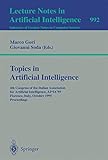Topics in Artificial Intelligence [electronic resource] : 4th Congress of the Italian Association for Artificial Intelligence AI*IA '95 Florence, Italy, October 11–13, 1995 Proceedings / edited by Marco Gori, Giovanni Soda.
Material type: TextSeries: Lecture Notes in Computer Science, Lecture Notes in Artificial Intelligence ; 992Publisher: Berlin, Heidelberg : Springer Berlin Heidelberg, 1995Description: XIV, 450 p. online resourceContent type: text Media type: computer Carrier type: online resourceISBN: 9783540474685Subject(s): Computer science | Artificial intelligence | Computer Science | Artificial Intelligence (incl. Robotics)Additional physical formats: Printed edition:: No titleDDC classification: 006.3 LOC classification: Q334-342TJ210.2-211.495Online resources: Click here to access online
TextSeries: Lecture Notes in Computer Science, Lecture Notes in Artificial Intelligence ; 992Publisher: Berlin, Heidelberg : Springer Berlin Heidelberg, 1995Description: XIV, 450 p. online resourceContent type: text Media type: computer Carrier type: online resourceISBN: 9783540474685Subject(s): Computer science | Artificial intelligence | Computer Science | Artificial Intelligence (incl. Robotics)Additional physical formats: Printed edition:: No titleDDC classification: 006.3 LOC classification: Q334-342TJ210.2-211.495Online resources: Click here to access online  E-BOOKS
E-BOOKS
| Current library | Home library | Call number | Materials specified | URL | Status | Date due | Barcode |
|---|---|---|---|---|---|---|---|
| IMSc Library | IMSc Library | Link to resource | Available | EBK6079 |
Natural Language Generation as constraint-based configuration -- Issues of multilinguality in the automatic generation of administrative instructional texts -- Extending Q-learning to Fuzzy Classifier Systems -- Fuzzy cognitive maps in multi-agent environments -- Multiple predicate learning with RTL -- Learning while -Solving problems in single agent search: Preliminary results -- Automatic construction of navigable concept networks characterizing text databases -- Temporal prediction: Dealing with change and interactions within a causal framework -- Non-first-order features in concept languages -- PDL-based framework for reasoning about actions -- Dependency graphs in natural language processing -- Integrating shallow and linguistic techniques for Information extraction from text -- Recognizing preliminary sentences in dialogue interpretation -- Contextuality and non-extensional identity: the inescapable symbiosis in NLP -- Priorities in Default Logic revisited -- Boolean approach for representing and solving constraint-satisfaction problems -- Composing decision procedures: the approach and a case study -- Knowledge representation, exemplification, and the Gupta-Belnap theory of circular definitions -- $$\mathcal{T}\mathcal{R}\mathcal{D}\mathcal{L}$$ : A language for conceptual modelling in Information Systems Engineering -- The different roles of abstraction in abductive reasoning -- A cognitive model of causal reasoning about the physical world -- A generalized approach to consistency based belief revision -- A framework for dealing with belief-goal dynamics -- Evolving non-trivial behaviors on real robots: An autonomous robot that picks up objects -- A formal domain description language for a temporal planner -- A method for solving multiple autonomous robots collisions problem using space and time representation -- Mapping symbolic knowledge into locally receptive field networks -- Knowledge representation for robotic vision based on conceptual spaces and attentive mechanisms -- A weakest precondition semantics for conditional planning -- A cognitive hybrid model for autonomous navigation -- Using a chemical metaphor to implement autonomous systems -- Modeling process diagnostic knowledge through causal networks -- Formalizing reasoning about change: A temporal diagnosis approach -- Preventive diagnosis: Definition and logical model -- Learning programs in different paradigms using Genetic Programming -- Revision of logical theories -- Reformulation of examples in concept learning of structural descriptions -- Integrated Model — A Proposal to handle noise -- Exceptions-based synthesis of Boolean functions as a core mechanism to perform concept learning -- Seeing is believing -- Agents as reasoners, observers or believers -- Modelling interactions in agent system -- Agent coordination and control through logic theories.
This book presents the refereed proceedings of the 4th Congress of the Italian Association for Artificial Intelligence, AI*IA '95, held in Florence, Italy, in October 1995. The 31 revised full papers and the 12 short presentations contained in the volume were selected from a total of 101 submissions on the basis of a careful reviewing process. The papers are organized in sections on natural language processing, fuzzy systems, machine learning, knowledge representation, automated reasoning, cognitive models, robotics and planning, connectionist models, model-based reasoning, and distributed artificial intelligence.


There are no comments on this title.